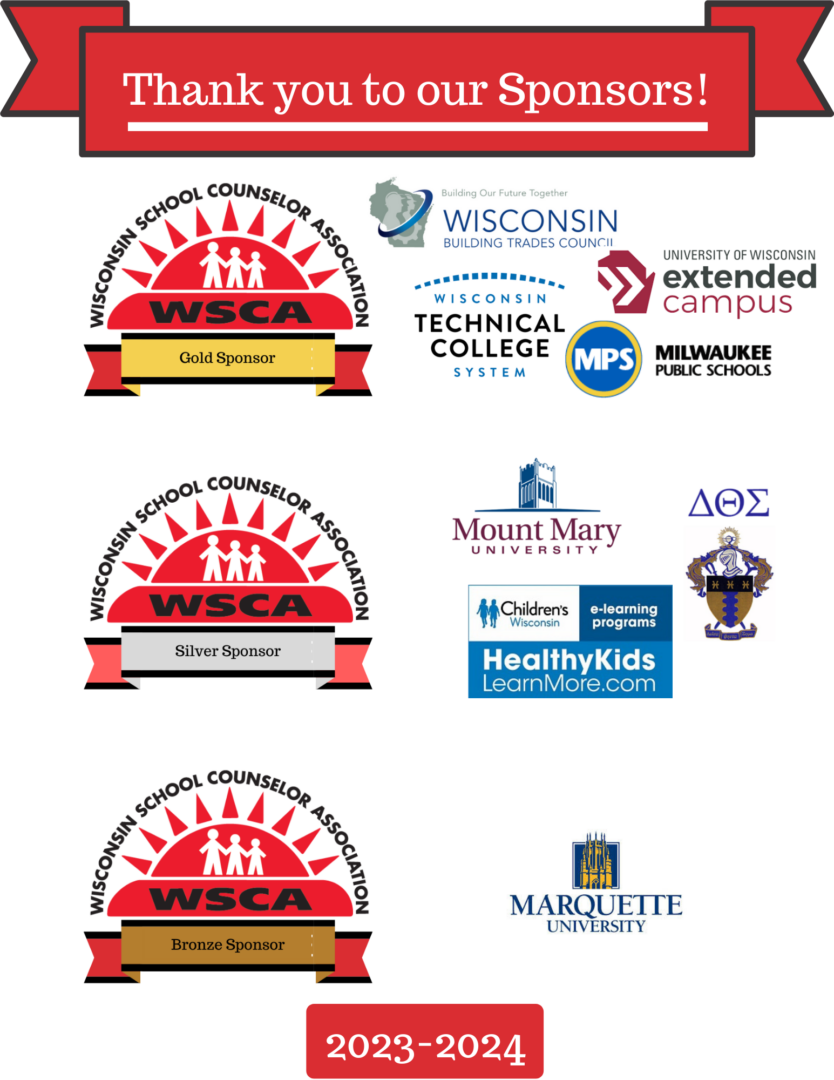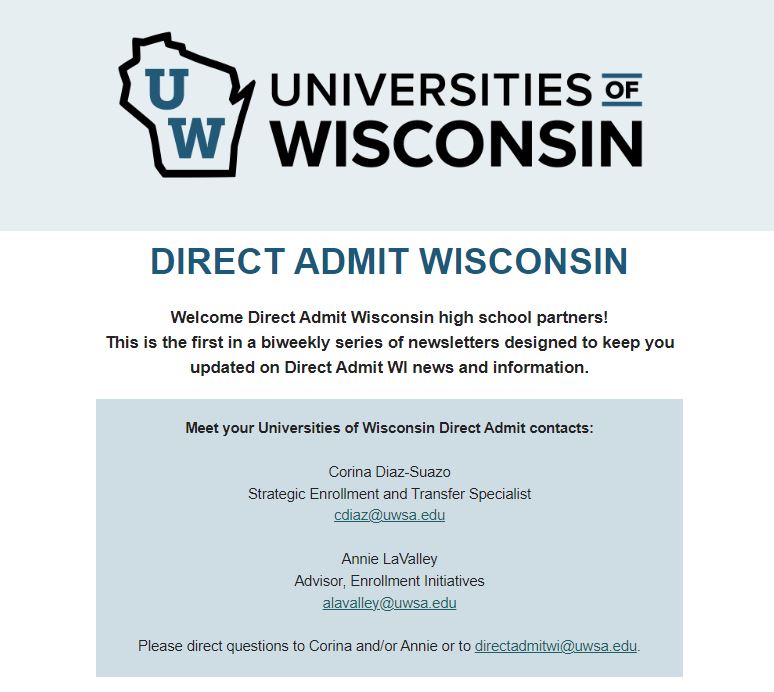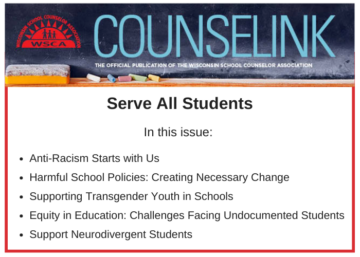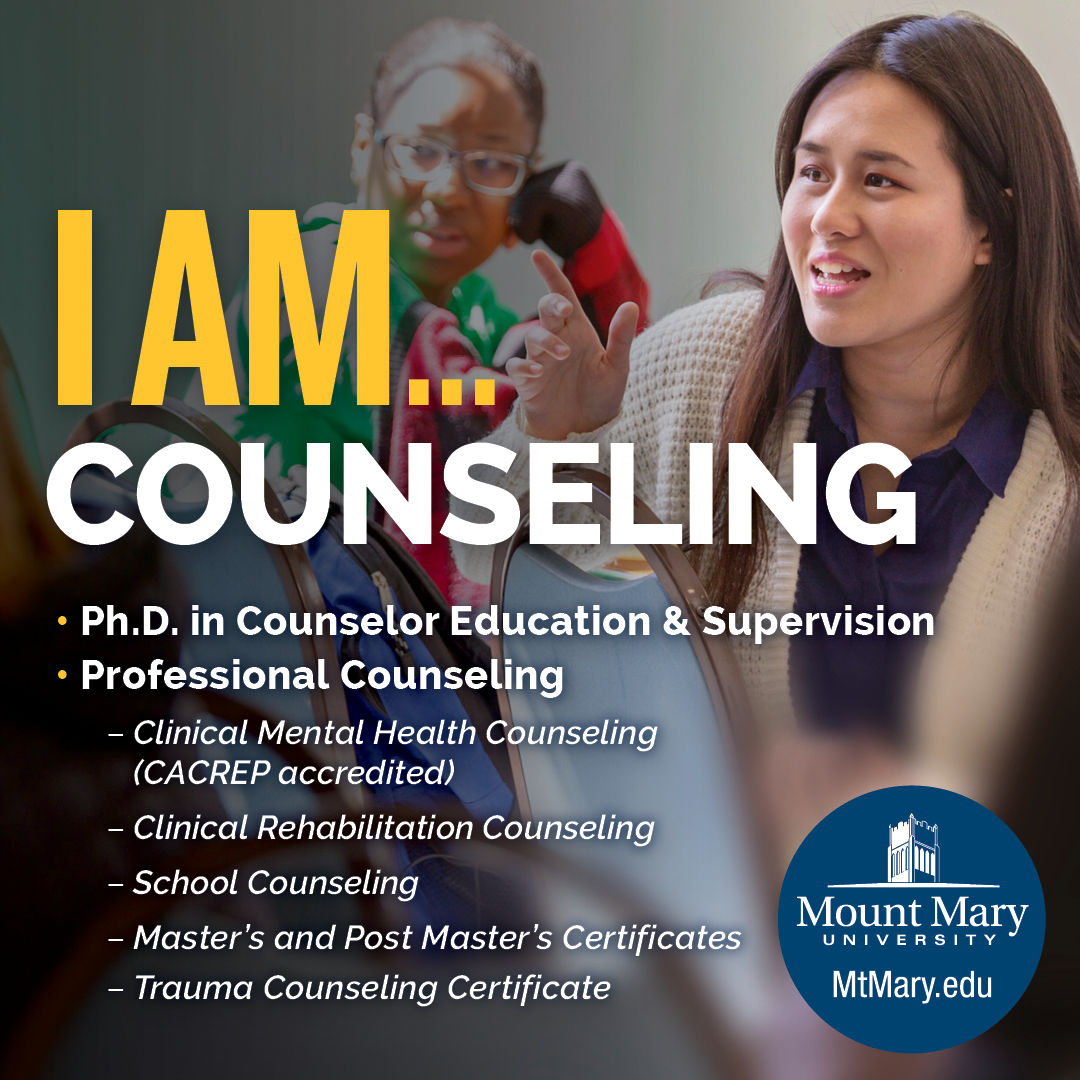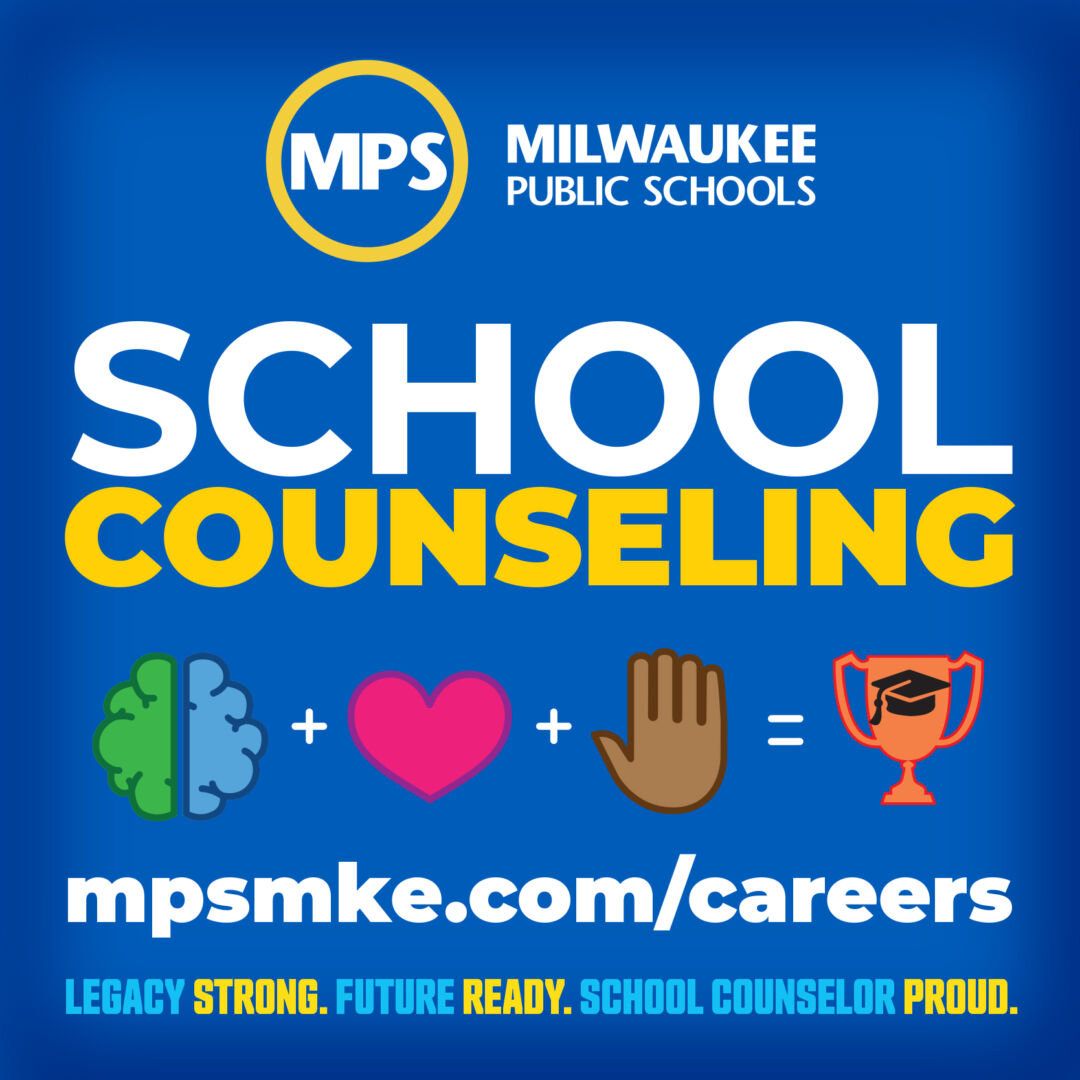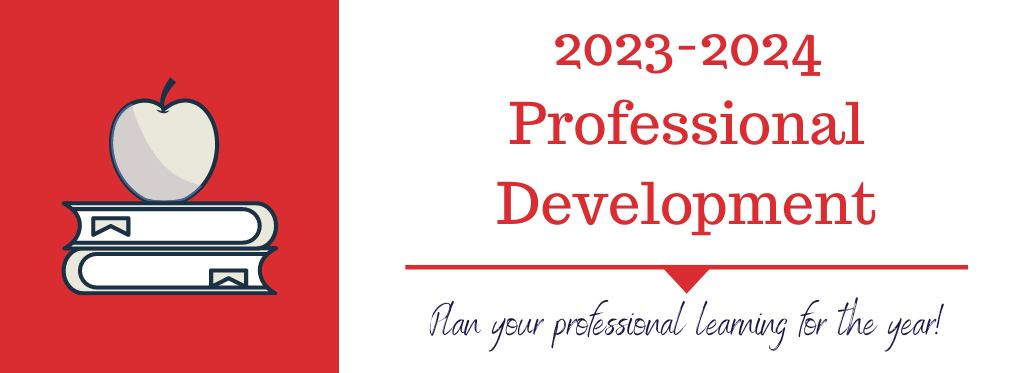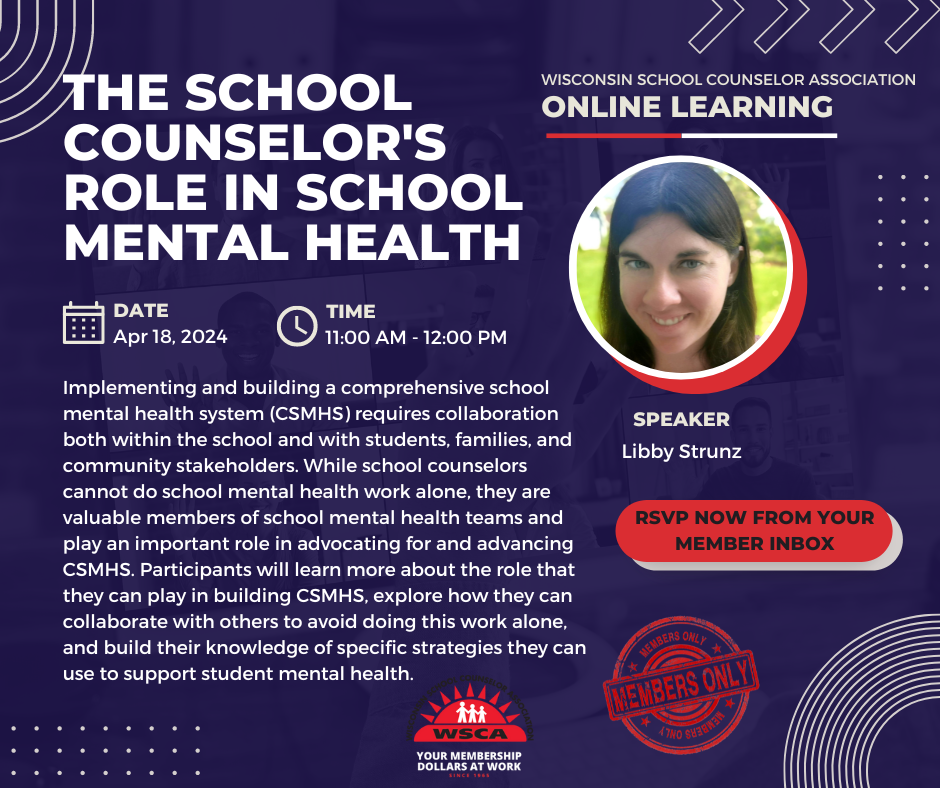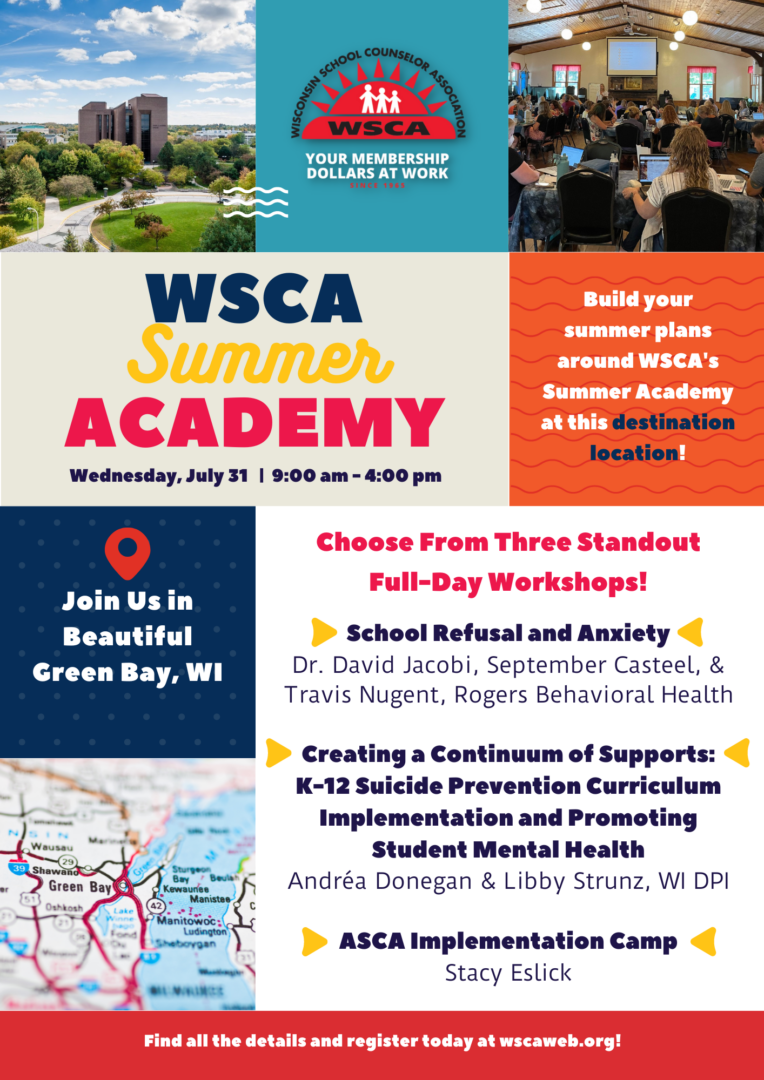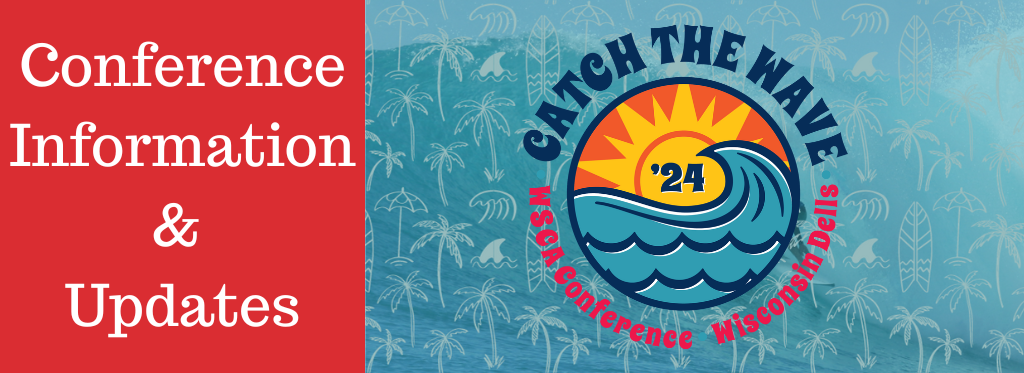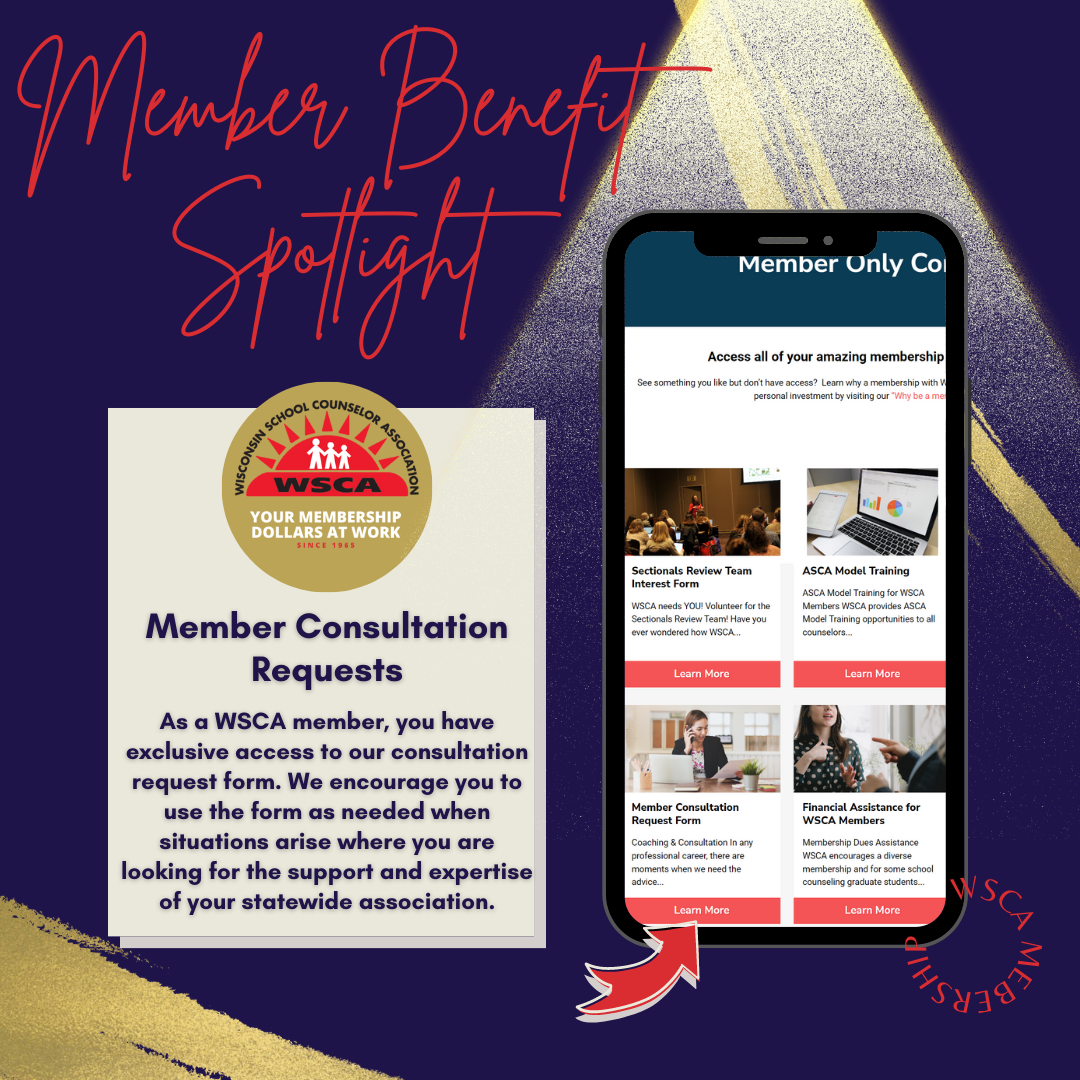April 2024

A Message from Shelley Joan Weiss
 April – the Month of the Military Child
April – the Month of the Military Child
It’s officially April. We love that April means spring is here, but we also love that April is the “Month of the Military Child,” and we get to honor the military children in our districts and throughout the United States. As the Wisconsin Commissioner for the Interstate Compact on Educational Opportunities for Military Children, I am proud to recognize our military children and their families, as well as the many educators and their families who have served or are serving in the military.
The Month of the Military Child started in 1986 when Secretary of Defense Casper W. Weinberger realized that no one was recognizing the sacrifice that military children make by having one or both parents in the military. He thought that military children were inspirational in how they handled hard situations, like being separated from family members due to deployment and frequently moving.
Did you know…
- There are approximately 2 million military children, ranging in age from newborn to 18 years old
- We have just under 10,000 school-aged children who are military children in Wisconsin
- Military families relocate 3 times more often than civilian families on average, every 2-3 years
- Since 2001, more than 2 million children have had a parent deployed at least once
- 1/3 of school-age military children show psychosocial and trauma-induced behaviors such as being anxious, worrying often, and crying more frequently than other children
- The repeated and extended separations and increased hazards of deployment compound stressors in military children’s lives
In order to honor and reach out to children who are dealing/have dealt with a parent or both parents in the military, we ask that everyone Purple Up. Purple references the joint environment of the military, encompassing all service branches, Active Duty, Reserve, National Guard, and Veterans. Purple combines each branch’s colors into one: the Air Force, Navy, and Coast Guard all use shades of blue, the Army uses green, and the Marines use red. We invite everyone to wear purple during the week of April 15th as a visible way to show support and thank military children for their strength and sacrifices. Each school may choose the date on which they want to celebrate the military children in their school.
Even though these “Month of the Military Child” events are taking place in April, there are many organizations that work year round to better the lives of military children. Here’s a few of the organizations that work hard to recognize military children and the sacrifices they have to make.
- Sun Prairie Area School District Resources for Military Families
- DPI Proclamation
- Governor Ever’s Proclamation
- MIC3
- Military Child Education Coalition
- Department of Defense
- National PTA
- Military One Source
- Military Health
- Bloom Military Teens
- PsychArmor
Military children make many sacrifices by having a parent or both parents in the military, so we are thankful for the educators and the organizations that help to make April a fun month for the children being affected, as well as the organizations who work with military families all year round. Remember to wear your purple the week of April 15th to show your support!
~Shelley Joan Weiss, Wisconsin Commissioner for the Interstate Compact on Educational Opportunities for Military Children
shelleyjoan.weiss1@gmail.com
A Message from the WSCA Board of Directors


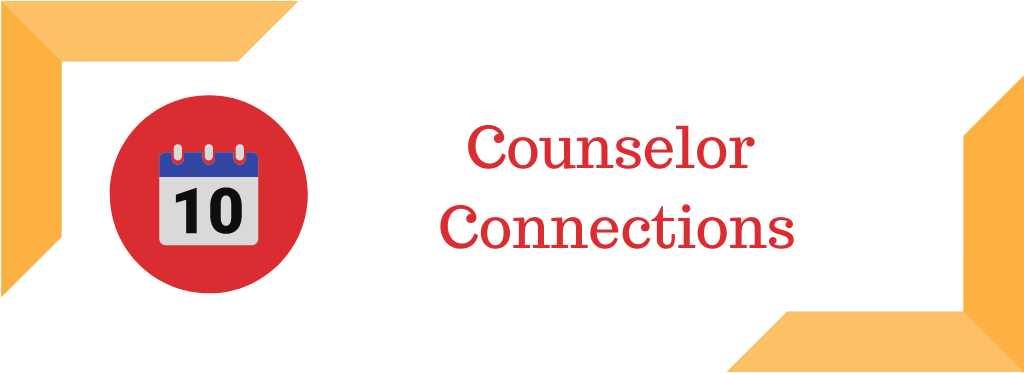
Counselor Connections




ASCA Connections
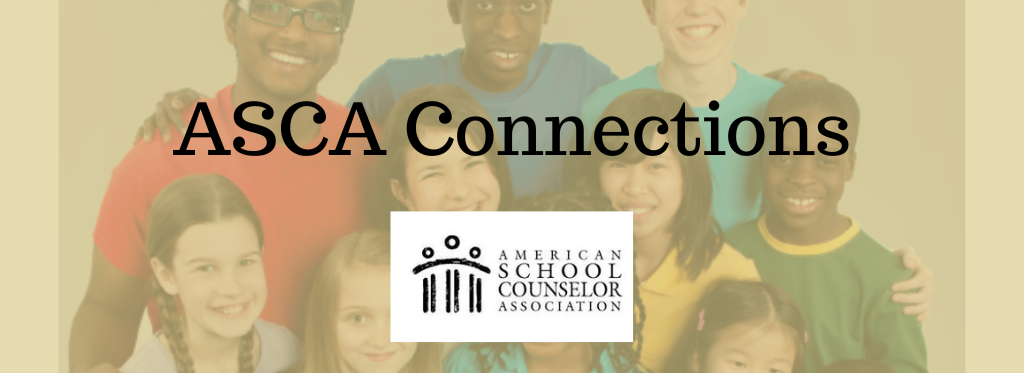
RAMP Winners
Congratulations to three Wisconsin schools that earned the ASCA RAMP (Recognized ASCA Model Program) award! We are so proud of all of you! Share a shout out to Cindy Bourget, Elk Mound Middle School; Sarah Flier, Willow River Elementary School; and Ann De Pagter, Regan Haulotte, Steve Schneider & Giselle Simons, and Sheboygan South High School. They join three other Wisconsin schools that earned the RAMP designation.

Provide feedback on the ASCA School Counselor Education Faculty
These standards have recently been updated by the ASCA Ethics Committee with input from school counselor educators and are now available for public comment. Review the updated standards and provide your feedback here. The deadline for feedback is April 5.
WSCA Counselink: Serve All Students

Feature Article – Serving ALL Students
Serving ALL Students
Marianne Matt, School Counselor, Capital High
Serving all students is a given, right? As school counselors we are constantly thinking about how to ensure that our students are able to access their education and how to remove barriers to ensure that they can do so. Something that we all need to consider in our day to day work is whether or not we truly are serving all of our students. I reflect on this regularly.
All students should have access to a comprehensive school counseling program. ASCA Ethical Standards state: “Students have the right to: …Equitable access to a school counseling program that promotes academic, career and social/emotional development and improves student outcomes for all students, including students historically and currently marginalized by the education system; Equitable access to school counselors who support students from all backgrounds and circumstances and who advocate for and affirm all students regardless of but not limited to ethnic/racial identity; nationality; age; social class; economic status; abilities/disabilities; language; immigration status; sexual orientation; gender identity; gender expression; family type; religious/spiritual identity; and living situations, including emancipated minor status, wards of the state, homelessness or incarceration.” Partnering with cross categorical/special education teachers and special education aids along with regular teaching staff and other pupil services staff to scaffold or adapt the school counseling program will ensure that all students are receiving the school counseling programming. Not everyone has the training in career and college education nor do they have the counseling skills that help us to elicit student personal preference. It is our job to partner with staff to ensure students can access programming.
Sometimes we get wrapped up in our work and the many demands that are put on school counselors. Even after many years into the work, it is essential that I continue to meet each student where they are right now and not where I expect them to be. This could look like approaching the young person who is consistently out of class and meeting with them in the hallway to find out what the barrier is that is keeping them from accessing their education. This could also look like small groups of students working on scholarship applications or other post high school applications. This is where we start to tier our work. Targeting certain groups for that extra support doesn’t mean that a student is lacking, it simply means that they need more tiered supports. Working with students for whom school is not their number one priority (for a myriad of reasons), it is essential that we remember that first and foremost, their lives and their choices (that are in their control) are theirs to direct. We can offer information and provide opportunities and resources and support but we can not determine what students will ultimately do with it. Continuing to love students for who they are, and the individuals they are, with the circumstances to which they come to us, is paramount to any school or district goal.
As we enter the final part of the school year, I encourage you to reflect on your practices, adjust where you can for this school year, and start to plan how to meet the needs of all students in a data driven comprehensive school counseling program. This is what I will be doing!
References:
ASCA Ethical Standards for School Counselors
Templates & Tools – American School Counselor Association (ASCA) – school counseling program assessment
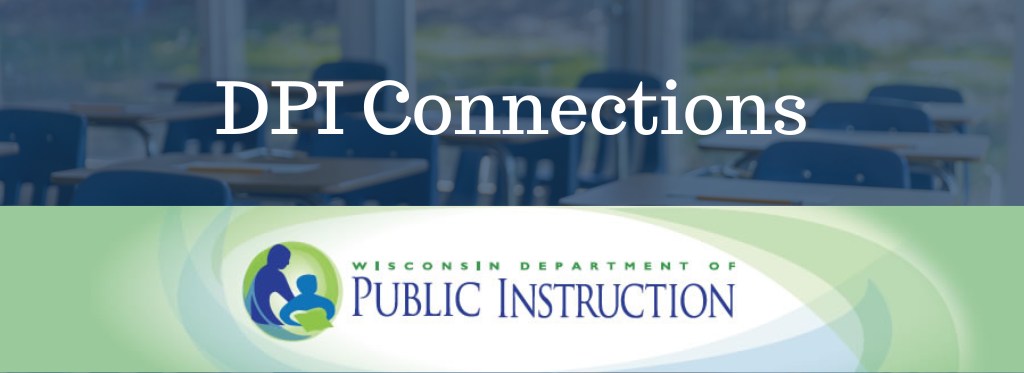
DPI Connections
Herb Kohl Educational Foundation Announces 2024 Scholarship and Award Recipients
Teacher Fellowship awards of $6,000 will be presented to 100 teachers who were nominated for their leadership and service in and outside the classroom, their ability to inspire a love of learning and to motivate their students. Congratulations to the school counselors who received this recognition.
DPI Cabinet Leadership Transition
Dr. Jill Underly, Wisconsin Superintendent of Public Instruction, announced several cabinet level changes, you can learn more here.
Migrant Education Program: What To Know and How To Help
Learn more about how Title I, Part C, Migrant Education Program and provisions of Title I, Part A of the Every Student Succeeds Act (ESSA) provide migratory students with the supplemental instructional services and support they need to succeed as responsible citizens with access to higher education learning opportunities and productive employment.
School Mental Health Improvement Webinar Series
Join DPI for a webinar series introducing the Roadmap for School Mental Health Improvement. The Roadmap breaks down five steps for improving the quality of a school’s current mental health system and provides a flexible approach to promoting student and staff well-being and more equitable outcomes for Wisconsin students.
- Intro to the Fishbone Tool April 4th, 2024 10:00-10:30 AM
- Intro to the Driver Diagram Tool April 11th, 2024 10:00-10:30 AM
- Intro to the Measurement for Improvement Tool April 18th, 2024 10:00-10:30 AM
- Intro to the Empathy Interview Tool April 25th, 2024 10:00-10:30 AM
- Intro to the Rapid Cycle Testing Tool May 2nd, 2024 10:00-10:30 AM
You Spoke, We Listened
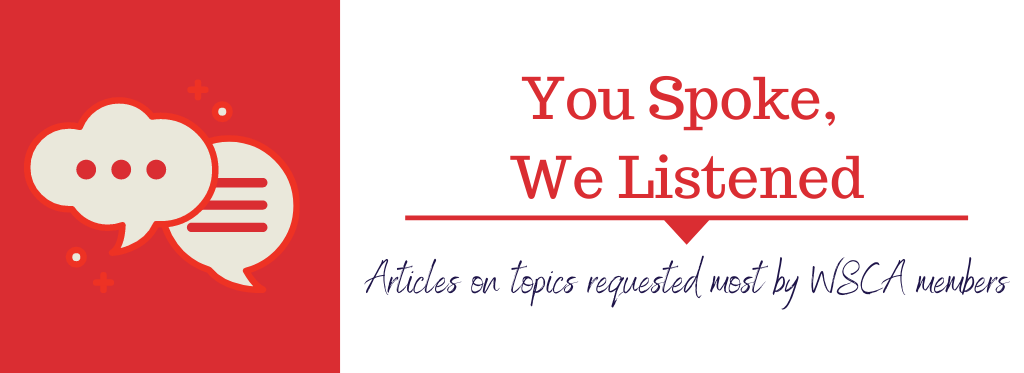
![]()
DHS Launches Wisconsin Wayfinder: Children’s Resource Network
From DPI: As educators in Wisconsin schools, you have incredible access to providing families with timely and relevant information. Wisconsin Wayfinder is a resource to share with all families in your schools and districts, and in particular families with children with disabilities or mental health needs. Wisconsin Wayfinder helps families find county and statewide disability and mental health services beyond the support provided by schools. As a close partner with Wisconsin Department of Health Services (DHS), Wisconsin DPI asks school and district leaders to please share out the below information on your school district webpages, newsletters to families, and consider sharing information about Wisconsin Wayfinder with families at individualized education program meetings.
The Wisconsin Department of Health Services (DHS) launched this new service that will transform the support structure for families of children with delays, disabilities, special health care needs, or mental health conditions. Wisconsin Wayfinder: Children’s Resource Network includes a user-friendly website and toll-free helpline that lets families easily connect with real people – dedicated children’s resource guides – who will help navigate through the essential services and supports that will enable their children to thrive.
A statewide, user-friendly website, dhs.wi.gov/wiscway, and toll-free number, 877-WiscWay (877-947-2929), provide families with convenient, direct access to compassionate and knowledgeable children’s resource guides.
![]()
Effect of Exercise for Depression: Systematic Review and Network Meta-Analysis of Randomized Controlled Trials
We continue to hear from counselors about how mental health concerns continue to increase. Below is a recently published study that speaks to what young people can do to manage and cope with depressive symptoms.
February 2024, Study Conclusions: Exercise is an effective treatment for depression, with walking or jogging, yoga, and strength training more effective than other exercises, particularly when intense. Yoga and strength training were well tolerated compared with other treatments. Exercise appeared equally effective for people with and without comorbidities and with different baseline levels of depression. To mitigate expectancy effects, future studies could aim to blind participants and staff. These forms of exercise could be considered alongside psychotherapy and antidepressants as core treatments for depression. Read the full report.
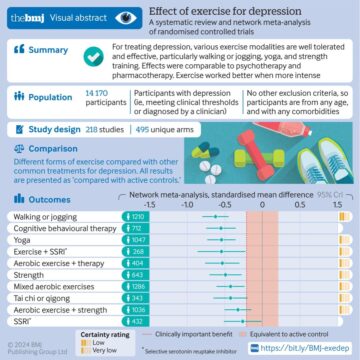
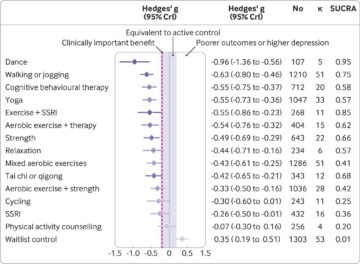
![]()
UW Programs Offer Online Courses for Early College Credit
Helping students earn college credits while in high school is a great way to promote college access and affordability through dual enrollment programs that have positive effects on their current and future academic performance. UW Extended Campus partners with Universities of Wisconsin campuses to offer convenient and flexible online courses for high school students, including those eligible for Wisconsin’s Early College Credit Program (ECCP), through the UW Associate of Arts and Sciences (AAS) and UW Independent Learning (IL) programs.
The UW Associate of Arts and Sciences is a 100% online semester-based program where students can take individual courses or pursue an associate degree featuring a broad liberal arts curriculum that serves as a foundation for bachelor’s degrees throughout the Universities of Wisconsin and other four-year schools. The AAS offers over 50 transferable general education courses in a variety of subject areas. AAS courses popular with high school students include:
- UWX CM101 – Introduction to Public Speaking
- UWX PS101 – General Psychology
- UWX SC101 – Introduction to Sociology
- UWX PH101 – Critical Thinking
- UWX HE209 – Nutrition and Weight Management
Students interested in registering for AAS courses can apply through one of the program’s partner campuses: UW-Eau Claire, UW-Parkside, UW-River Falls, UW-Stevens Point, and UW-Whitewater.
UW Independent Learning offers an array of over 40 college-level courses developed and taught by UW faculty. Courses transfer to all UW campuses, and are fully online and self-paced, allowing students the extra convenience of setting their own course deadlines and completing work around their personal schedules. Popular IL courses for high school students include:
- U3600-215 – Calculus II
- U3600-216 – Calculus III
- U200-100 – Personal Health
- U912-101 – Spanish 101: First Semester Spanish
- U400-101 – French 101: First Semester French
Students register for IL courses through UW Extended Campus, and there is no application requirement. More information about high school student opportunities can be found here.
Interested in learning more about selecting high quality online courses? Join us for a WSCA Online Learning presentation on Wednesday, April 24th from 11:30 am -12:30 pm. Presenters from UW Extended Campus will discuss ways that school counselors can better understand the features and characteristics of quality online educational programming that empowers student success.
Legislative Updates

Legislative and Advocacy Updates for April 2024
WSCA’s Virtual Afternoon on the Hill Event Update
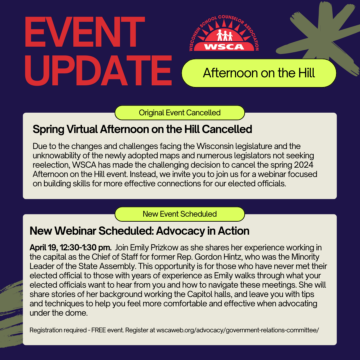
Registration for the newly scheduled webinar can be found on our Government Relations Webpage.
2023-25 Legislative Session Recap
As the 2023-25 legislative session has ended, Governor Evers has signed and vetoed numerous bills that would impact school districts. The topics of bills range in topic from raising safety standards, broadening a tech-ed grant program, educator licensing, changes to certain aspects of Act 20 training and screener requirements, and numerous stocking medication bills.
Of note for school counselors, the Governor signed AB 1050 into law as 2023 Wisconsin Act 240. The bill will allow the Office of School Safety to use funds raised through concealed carry permit fees to continue funding their operations. This stopgap measure authored by Sen. Quinn and Rep. Novak, only allows for these measures to stay in effect through the next budget cycle.
Evers vetoed AB 377 which would have required all schools in Wisconsin that run athletics to organize school sports into one of three categories: male, female, or co-ed. In addition, the bill forbids male pupils from participating on a team designated for females and allows female athletes to bring legal action against a school district if they feel the district is not complying with the law. Earlier this session the bill passed the Assembly along party lines, and passed the Senate with one Republican voting against the bill. The governor had previously stated that he would veto the bill if it were to reach his desk.
With the new legislative maps and upcoming elections, WSCA will continue to share resources on changes that may be impacting your elected representative. The Wisconsin Association of School Boards has an excellent legislative update blog that is open to the public to get the latest information on issues impacting public education in Wisconsin.



